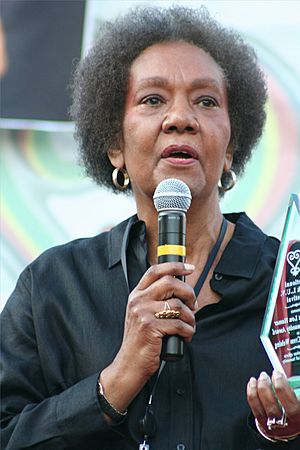Frances Cress Welsing facts for kids
Quick facts for kids
Frances Cress Welsing
|
|
|---|---|

Welsing receives Community Award at National Black LUV Festival on September 21, 2008
|
|
| Born |
Frances Luella Cress
March 18, 1935 |
| Died | January 2, 2016 (aged 80) Washington, D.C., U.S.
|
| Alma mater | Antioch College (B.S.), Howard University (M.D.) |
| Occupation | Physician |
| Known for | The Isis Papers: The Keys to the Colors (1991) |
Frances Luella Welsing (born Frances Luella Cress; March 18, 1935 – January 2, 2016) was an American psychiatrist. She was known for her ideas about racism and white supremacy. In 1970, she wrote an essay called The Cress Theory of Color-Confrontation and Racism (White Supremacy). This essay shared her thoughts on how she believed white supremacy began.
She also wrote a well-known book titled The Isis Papers: The Keys to the Colors in 1991.
Contents
Early Life and Education
Frances Luella Cress was born in Chicago, Illinois, on March 18, 1935. Her father, Henry N. Cress, was a doctor, and her mother, Ida Mae Griffen, was a teacher.
Frances went to Antioch College, where she earned a science degree in 1957. Later, in 1962, she received her medical degree from Howard University.
In the 1960s, Welsing moved to Washington, D.C.. She worked at several hospitals, especially those for children. While teaching at Howard University, she wrote her first major work in 1969. It was called The Cress Theory of Color-Confrontation and was published in 1970. This paper introduced many of the ideas she would later expand on in her book, The Isis Papers.
Her Main Work: The Isis Papers
In 1992, Frances Welsing published her most famous book, The Isis Papers: The Keys to the Colors. This book was a collection of essays she had written over 18 years.
The title "The Isis Papers" was inspired by Isis, an ancient Egyptian goddess. Isis was known for her connection to truth and justice. Welsing admired these qualities.
In her book, Welsing discussed what she saw as global issues affecting people of color. She also wrote about challenges faced by Black people in the United States. She believed that racism and injustice would end when people worldwide understood and discussed these issues openly. She also looked at problems like high rates of incarceration and unemployment in the Black community.
Her Views on Racism
Frances Welsing had strong views on racism. She defined racism as a system of white supremacy. She believed it was a global issue that affected non-white people.
Welsing thought that injustice caused by racism would stop when people understood how it worked. She was against white supremacy and what she saw as the unfair treatment of Black men.
Later Life and Death
By December 30, 2015, Frances Welsing had two strokes. She was taken to a hospital in Washington, D.C.. She passed away on January 2, 2016, at the age of 80.
Film Appearances
Frances Welsing appeared in several documentary films:
- She was in 500 Years Later (2005), a documentary directed by Owen Alik Shahadah.
- She also appeared in Hidden Colors: The Untold History of People of Aboriginal, Moor, and African Descent (2011). This film was directed by Tariq Nasheed.
Works
 | Tommie Smith |
 | Simone Manuel |
 | Shani Davis |
 | Simone Biles |
 | Alice Coachman |

